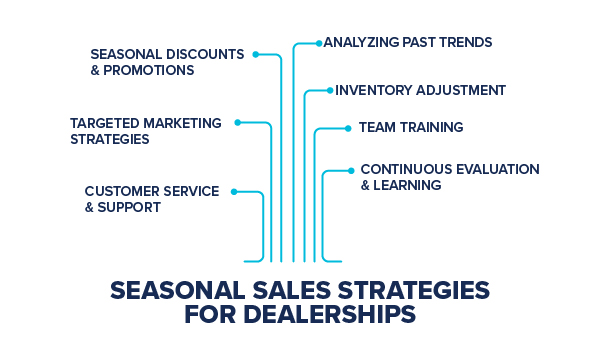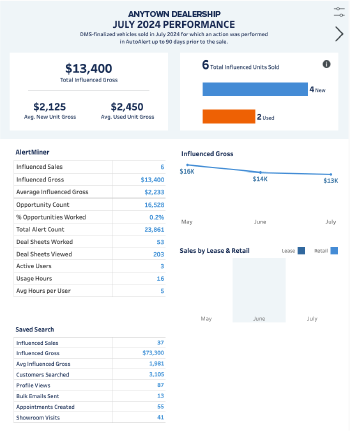Seasonal Sales Strategies for Dealerships
Learn insights into effective dealership seasonal sales strategies, including holiday promotions, summer sales events, and year-end clearance.
The dealership sales world is not a constant, static environment. It’s dynamic, ever-changing, and influenced by various factors, including the seasons. There are both challenges and a range of opportunities across the seasons that can significantly impact car sales. Understanding the nature of dealership seasonal sales is important for any dealership to thrive and adapt to the challenges and opportunities that arise throughout the year.
The ability to anticipate and manage these changes can determine whether the year is successful. We will explore the potential seasonal fluctuations and provide strategic tips to help dealerships effectively navigate the highs and lows and embrace opportunity.


The Challenge of Seasonality
Seasonal changes can lead to fluctuating demand for products or services. Accurate revenue forecasting is essential for effective sales management, but seasonal fluctuations can make this challenging. Understanding these variations is important to manage inventory, marketing, and customer service effectively. Sales managers must use historical data analysis, market research, and customer insights to anticipate sales patterns and make informed decisions.
Peak Seasons
According to an article by Investopedia, new and used cars tend to experience similar seasonal fluctuations in sales volume. The two peak seasons for auto sales typically occur in the spring and the fall. The fall surge in sales is partly due to U.S. auto manufacturers traditionally releasing new models for the upcoming year. After reaching their peak in November, vehicle sales usually decline sharply in January. However, since 2013, this trend has shifted, with the industry seeing stronger winter sales. This change is largely driven by the aggressive discounts and year-end deals offered by dealerships to clear out inventory, especially around the holidays.
Analyzing Past Trends
Effectively managing seasonal fluctuations begins with analyzing data. Historical sales data, customer behavior insights, and market research offer valuable guidance for understanding the impact of seasonality and making informed data-driven decisions.
Data and analytics help identify periods when demand for specific vehicle types rises or falls. By understanding these patterns, dealerships can adjust their inventory and marketing strategies to meet consumer needs.


Inventory Adjustment
Once trends are identified, aligning inventory with anticipated customer demands is essential. By expanding the range of vehicles offered or introducing seasonal options, dealerships can attract new customer segments. This might involve boosting the stock of SUVs and all-wheel-drive vehicles before winter or adding more convertibles and sports coupes for the summer. Proactive inventory management helps close more car deals by maximizing sales while minimizing excess storage costs.
Seasonal Discounts and Promotions
Leveraging seasonal discounts and promotions is an effective way to attract customers and boost sales. This might involve offering special promotions, seasonal discounts, or themed sales events highlighting the vehicles most in demand during that time. Whether it’s a back-to-school sale, a summer clearance event, or a holiday promotion, dealerships can capitalize on the seasonal excitement to drive traffic and increase revenue.
Targeted Marketing Strategies
To make gains during seasonal fluctuations, marketing campaigns should be tailored distinctly for each season. Aligning messaging, visuals, and promotions with the season’s spirit helps dealerships capture consumer attention. Leveraged data can help effectively target consumers, which leads to higher conversions and increased sales. Tailored digital and direct email campaigns, an optimized website updated with promotional banners and seasonal offers, and social media ads contribute to a proactive marketing campaign.


Customer Service and Support
Providing outstanding customer service is crucial during peak demand periods. Responsive and efficient support can turn an engaged customer into a sale. This includes promptly addressing online inquiries, arranging test drives, and offering personalized financing solutions. Additionally, maintaining clear communication throughout the purchasing process and following up after the sale can enhance customer satisfaction, fostering long-term loyalty. Don’t fail to gather feedback and customer insights that can help refine your sales tactics and address areas for improvement.
Team Training
An equipped sales team that can meet customer needs during peak seasons can make or break a sale. This involves training on the features and advantages of the most in-demand models and honing sales and negotiation skills based on the latest promotion. Effective communication and collaboration are key during seasonal fluctuations. Open lines of communication should be maintained between sales teams, marketing departments, and other key stakeholders to ensure a unified and coordinated approach. Sharing insights, addressing challenges, and brainstorming ideas can lead to innovative solutions and better results.
Continuous Evaluation and Learning
Seasonal sales present a key opportunity to refine dealership strategies. By utilizing CRMs like AutoAlert CXM – the next-gen CRM, dealerships can measure and evaluate sales performance throughout the year, pinpointing areas of strength and improvement. This allows them to apply insights and make data-driven decisions to enhance sales approaches and boost results for future seasons. And we can’t forget to monitor the competition. Keeping an eye on competitors’ seasonal promotions and marketing strategies, with the support of AutoAlert CXM, can give you the insight needed to pivot and stay ahead of the game.
Understanding the seasonal nature of sales is essential for successful dealership sales management. Although it brings challenges, it also offers numerous opportunities to take advantage of.
To effectively navigate the seasonal landscape, sales managers should embrace data-driven decision-making, maintain agility and flexibility, continuously evaluate performance, and promote collaboration and communication. By adopting these practices, dealerships can adapt to shifting market dynamics while seizing seasonal opportunities and ultimately achieve sales success that can be sustained year after year.
Are you ready to turn dealership seasonal sales challenges into growth opportunities? AutoAlert can help you create a strategy that maximizes your sales and keeps you ahead all year.




